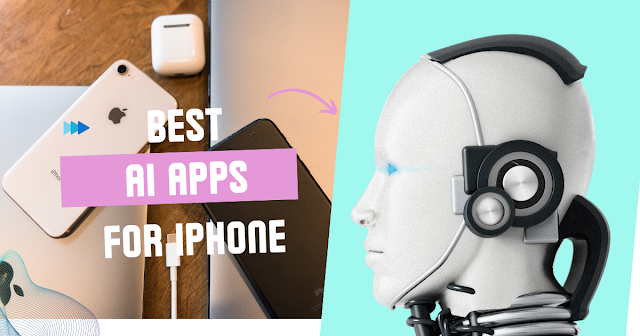Introduction
In recent years, the integration of artificial intelligence (AI) into mobile applications has revolutionized the way we interact with our smartphones. With the abundance of AI apps available on the App Store, iPhone users have access to a plethora of innovative solutions designed to simplify daily tasks, enhance productivity, and provide personalized experiences. In this article, we'll explore some of the best AI apps tailored specifically for iPhone users.
Understanding AI Technology
Before delving into specific apps, it's essential to understand the underlying technology that powers these applications. AI utilizes algorithms and machine learning models to analyze vast amounts of data, recognize patterns, and make intelligent decisions without human intervention. This enables AI apps to adapt to users' preferences, anticipate their needs, and deliver highly personalized experiences.
Criteria for Selecting the Best AI Apps
When evaluating AI apps for iPhone, several factors come into play. These include user interface design, functionality, reliability, privacy features, and overall user satisfaction. Additionally, the app's ability to leverage AI technology effectively to solve real-world problems is crucial.
Top AI Apps for iPhone
Virtual Assistants
Virtual assistants like Siri, Google Assistant, and Alexa have become indispensable tools for iPhone users. These AI-powered assistants can perform various tasks, including setting reminders, sending messages, making calls, and providing weather updates, all through voice commands.
Productivity Enhancers
AI-powered productivity apps such as Todoist, Evernote, and Trello help users streamline their workflow, organize tasks, and manage projects more efficiently. These apps leverage AI algorithms to prioritize tasks, suggest deadlines, and provide personalized recommendations based on users' habits and preferences.
Health and Fitness
In the realm of health and fitness, AI apps like MyFitnessPal, Lifesum, and Seven Minute Workout offer personalized workout plans, nutritional guidance, and activity tracking features. By analyzing users' data and behavior patterns, these apps can provide tailored recommendations to help users achieve their fitness goals.
Entertainment
AI-driven entertainment apps like Netflix, Spotify, and TikTok leverage machine learning algorithms to curate personalized content recommendations based on users' viewing or listening history. This personalized approach enhances the user experience by delivering relevant content that matches their interests and preferences.
Benefits of Using AI Apps on iPhone
The integration of AI technology into iPhone apps offers several benefits to users. These include:
- Enhanced User Experience: AI-powered apps provide personalized experiences tailored to individual preferences, resulting in a more intuitive and engaging user interface.
- Increased Efficiency: By automating repetitive tasks and providing intelligent recommendations, AI apps help users save time and boost productivity.
- Improved Decision Making: AI algorithms analyze complex data sets to provide users with valuable insights and recommendations, aiding in informed decision-making processes.
- Predictive Capabilities: AI apps can anticipate users' needs and preferences based on their behavior patterns, proactively providing relevant suggestions and reminders.
Potential Drawbacks
Despite their numerous benefits, AI apps also pose certain challenges and concerns. These include:
- Privacy Risks: The collection and analysis of user data by AI algorithms raise privacy concerns regarding data security and potential misuse of personal information.
- Dependency: Overreliance on AI-powered features may lead to a loss of critical thinking skills and reduced autonomy in decision making.
- Algorithmic Bias: AI algorithms are susceptible to bias based on the data they are trained on, leading to potential discrimination and inequity in the recommendations and decisions they make.
Future Trends in AI Apps
Looking ahead, the future of AI apps on iPhone is promising, with ongoing advancements in AI technology driving innovation and expanding the capabilities of mobile applications. Some emerging trends to watch out for include:
- Conversational Interfaces: AI-powered chatbots and virtual assistants will continue to evolve, offering more natural and human-like interactions with users.
- Predictive Analytics: AI algorithms will become increasingly adept at analyzing user data to predict future behaviors and preferences, enabling more accurate and proactive recommendations.
- Augmented Reality (AR) Integration: AI and AR technologies will converge to create immersive and interactive experiences in gaming, entertainment, education, and other fields.
- Ethical AI Development: There will be a growing emphasis on ethical AI development practices, including transparency, fairness, and accountability, to address concerns related to privacy, bias, and algorithmic accountability.
Conclusion
In conclusion, AI apps have transformed the way we use our iPhones, offering a wide range of innovative solutions to enhance productivity, streamline tasks, and personalize experiences. While they bring numerous benefits, it's essential to remain mindful of potential drawbacks and ethical considerations associated with AI technology. By staying informed and embracing responsible AI usage, iPhone users can leverage the full potential of these groundbreaking applications.
FAQs
- Are AI apps safe to use on iPhone?
- AI apps undergo stringent security and privacy measures to protect user data. However, users should exercise caution and review app permissions before granting access to personal information.
- How do AI-powered virtual assistants work?
- Virtual assistants like Siri utilize natural language processing and machine learning algorithms to understand user queries, retrieve relevant information, and perform tasks based on voice commands.
- Can AI apps replace human interaction?
- While AI apps can simulate human-like interactions to some extent, they cannot replace genuine human interaction and emotional intelligence.
- What are the potential privacy risks associated with AI apps?
- Privacy risks include unauthorized access to personal data, data breaches, and the misuse of user information for targeted advertising or surveillance purposes.
- How can users mitigate the risks of algorithmic bias in AI apps?
- Users can mitigate algorithmic bias by promoting diversity in training data, implementing bias detection and mitigation techniques, and advocating for transparent and accountable AI development practices.





0 Comments